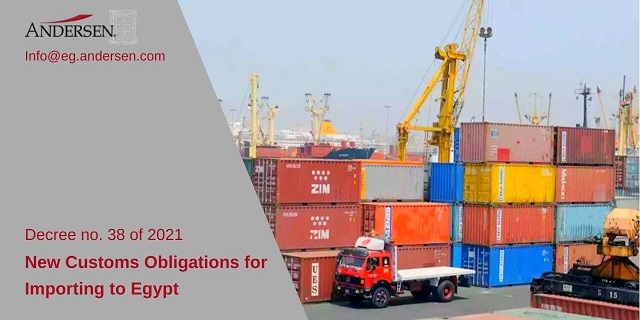
Decree No. 38 of 2021
The Minister of Finance, Dr. Mohamed Maait, published decree no. 38 of 2021 regarding the Advance Cargo Information "ACI" at Egyptian customs. The decree was issued to clarify the pre-registration of shipments procedures to be observed.
The Ministry has been keen on the gradual implementation of the new e-system in order to facilitate its services. The decree stipulates the experimental implementation of the ACI for the incoming shipments at seaports as of the 1st of April 2021, with mandatory implementation beginning on 1st July 2021.
Moreover, the decree aims to protect Egyptian citizens from anonymous cargo by monitoring any danger to the country through the Ministry's risk management system. Also, the decree aims to simplify and facilitate trade and investment procedures in Egypt.
The following shall summarize the main controls and procedures to be implemented by the ACI:
1- The importer, cargo owner, or his customs broker agent must make the shipment data available from the exporting country prior to the shipment. Submitting the data and digital documents for the cargo (the commercial invoice and the final or initial bill of lading) must be submitted 48 hours prior to shipment, to the Customs Authority by creating an account on the electronic platform (single window) and using the e-signature in the data entry.
2- Once the platform verifies the validity of the imported cargo, the Customs Authority responds to the data provider either with acceptance and issuance of the number of the Advance Cargo Information Declaration "ACID" for the shipment or rejection with the reasonable explanation.
3- The shipment data may be modified after the issuance of the ACID, except for the data of the two parties to the commercial transaction (importer and supplier).
Lastly, the decree is considered an unprecedented legislative development, as it represents a continuation of the tax and customs reform process after the issuance of Customs Law No. 207 of 2020. It also helps to create an investment climate, as the availability of pre-shipment data would reduce the release time of the cargo, and thereby reduce the cost borne by the importer for storage. Finally, this legislative reform indirectly leads to the expanding use of information and communication technology, eventually allowing the country to dispense with paper documents.
The content of this article is intended to provide a general guide to the subject matter. Specialist advice should be sought about your specific circumstances.


